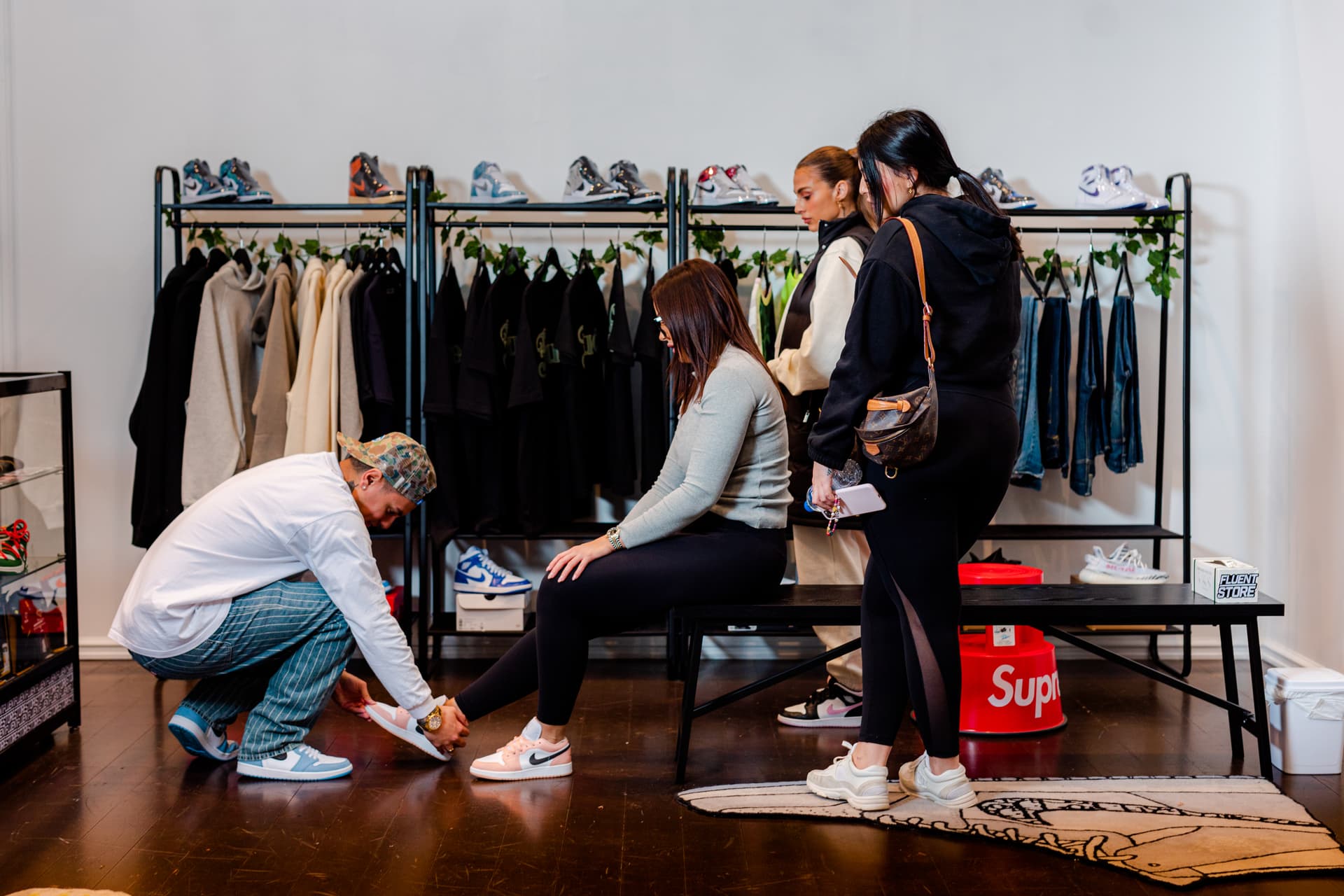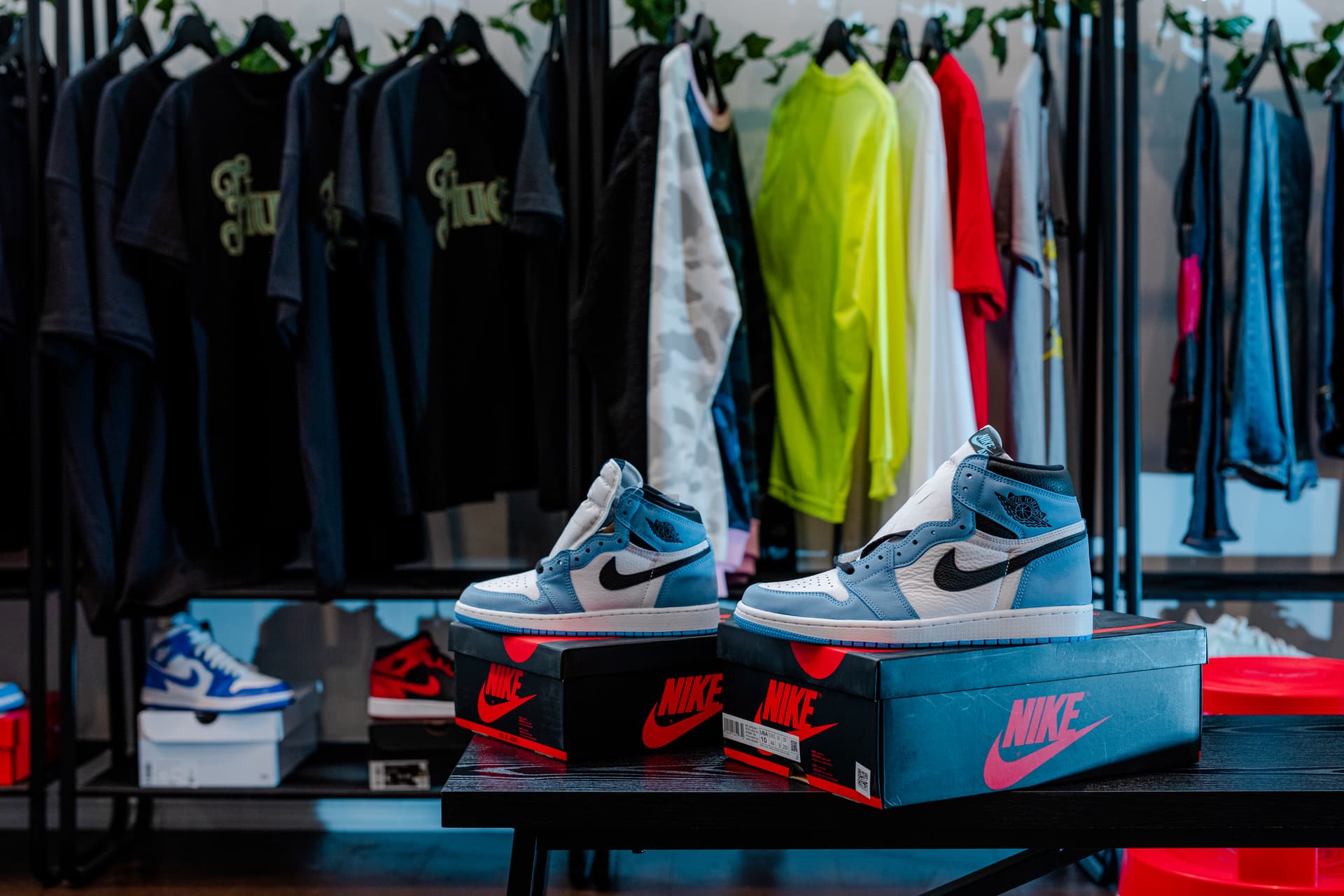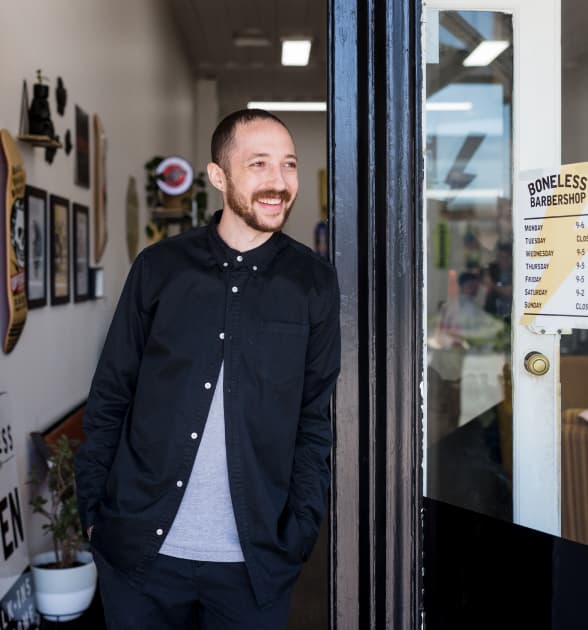
- Case Studies
Fluent Store: from Passion Project to Profitable Business
Smart social media marketing drew a two-hour-long line on opening day. The rest is history.
Since Fluent first opened doors in 2020, the streetwear store has become a mecca for sneakerheads. Collectors travel from all over to see the rare sneakers on display, while the feature wall – adorned with the latest Yeezies, Jordans, Nikes, and more – entices passers-by to step inside and grab their first pair of kicks.
The strength and size of Fluent's newfound customer base is a testament to the hard work that's gone on behind the scenes. Owners Logan and Esha began working on their business plan just under 18 months ago, while working as cleaners. After finishing the night shift at 8 AM, the couple would jump straight into business planning. Since then, they've juggled the creation of Fluent’s first website, two store openings, and become first-time parents.
We spoke to Logan and Esha about sneaker culture, the risk and reward of starting a business, and the benefits of selling in-person versus online.
When did your love for sneakers begin?
Logan: I’ve always been a fan of basketball, and the culture that comes with it – the style, the fashion. I had a few pairs of basketball shoes as a kid, but they were always hand-me-downs from my older brothers. I never actually got a fresh pair for myself. Then I moved to Australia, started getting my own money, and started collecting.
Esha: Then, from 2016 to 2019, we did a bit of traveling in America, Canada, and Europe. In each country that we went to, we made a point to find the best, hidden sneaker stores. It became a passion, and we starting thinking we’d like to create something similar at home – because we believe there’s a market for it.
When we returned from our most recent trip, we started listing and selling our own collection of sneakers on Instagram – the sneakers we had collected during our travels. We really, really wanted to hold on to those sneakers, but we thought if want to make something, we’re going to have to sell something. So we made the executive decision, and that's what helped us get where we are today.



How did you take your first steps into business ownership?
Esha: From April 2019, there was a lot of work going on in the background. It was still a hobby at that stage – it wasn’t making enough to be our main income, but it was always something we wanted to make our focus.
Our main job was cleaning, and we did night shifts. After finishing at 8 in the morning, we’d have the whole day spare – which is a lot of time to think about how we’re going to kick this off the ground. So, we went from selling on Instagram to setting up our own website.
Logan: We figured it would set us apart from other sneaker sellers on Instagram. If you have an online store, you look more authentic. It was the next step in authenticating our brand.
I think we only had 20 people on our site the day it launched, but we thought it was amazing – we had 20 people viewing our store! So that's where we started.
What made you decide to take the leap from e-commerce to brick-and-mortar?
Esha: I was the one who was more reserved and said we couldn’t open a physical store until we have enough revenue, or we have enough clientele. But then the pandemic began, and commercial tenancies seemed more affordable.
We already knew that Perth customers like to see you face-to-face, because Logan was out on the road meeting customers all the time, so we looked at what was in our budget. We worked out how many pairs of shoes we needed to sell to afford it, and went for it. If the worst comes to worst, we thought we could just get rid of the car if we had to!
Logan: In person, we can show customers the shoes and they can really understand what they’re buying, which helps grow our online presence as well as in-store traffic. It’s also a way to put a face to the brand, and deepen the connection with customers who have been shopping with us since we started.

What are you doing to drive foot traffic to your store?
Esha: There's always been a couple of things that we envisioned for the store, the two most important being great lighting and a large wall to showcase our shoes. That was one of the attractions for us when we traveled; every store had this amazing sneaker wall. No matter where we set up shop, we really wanted to try and achieve that.
So, we built it. Then we teased the launch on Instagram using the wall, and I think it did help in getting customers here. The day we opened the store, we didn’t even have a chance to look outside. So when we pulled the drop sheet and saw the line, it was a rewarding surprise.
We didn't check our clocks until two hours later and the line was still going. It was an amazing turnout. Any store owner’s hope is that people turn up when you’re opening, or launching a new product, or anything like that.
Logan: Now, everyone who comes to our store can step back and appreciate the sneaker wall. It’s Instagrammable. Customers come in, take a photo and share it on their stories – which helps us grow.
How does selling in-store compare to running an online business?
Esha: Most customers that buy from you online already know about your products. They already know the price point and the reasons behind it. A brick-and-mortar shop gives us the opportunity to speak with people who don’t. In-store, we’re able to explain the shoes to the customer, which really helps them understand and become educated about why a sneaker costs what it does, and the culture and history of the community.
Mums and Dads for example often don’t understand the sneaker game, or why they can be expensive. But when parents come in-store, we can educate them so hopefully they leave with a bit of appreciation about it. They often leave with a pair for themselves, that matches their kids.
The customer experience is one of our core values as a small business.

How is Zeller helping you provide a great customer experience?
Esha: Our first EFTPOS terminal, from another provider, required us to switch apps every time we processed a transaction. It left room for human error.
One of the main things we knew we wanted when the business grew was a sleek, user-friendly terminal we could both use, and give to any employees we hire without having to explain difficult processes.
Zeller Terminal is ten times easier to use. Ease of use is critical when you're getting a lot of foot traffic.
Logan: We recently went to a sneaker convention and found Zeller Terminal helped create a more trustworthy and friendly payment experience for our customers – which we feel is important, especially when you’re dealing with rare sneakers as they’re at an above-average price point.
Some other stores were accepting cash or bank transfers, but we were able to continue to accept transactions at the event using Zeller Terminal, without breaking our workflow. And the battery lasted the whole day, which was great as we had no access to power.
Ready to get started with Zeller?
Sign up now.jpg&w=1920&q=75)
Do you have any other plans for 2021?
Esha: Fluent already stocks Fluent-branded t-shirts, but we’d like to expand the product line. For that, we need to develop a team, find the right materials, and plan for production. The goal is to have a collection underway by the end of the year.
That, and making the in-store customer experience as great as it can be.

Let us help your business grow.
Zeller Sales is here to help you succeed.
Leave your contact details and we’ll be in touch soon.
By sharing your details with us, we may contact you from time to time. We promise we won’t bug you — and you can unsubscribe from communications at any time.



